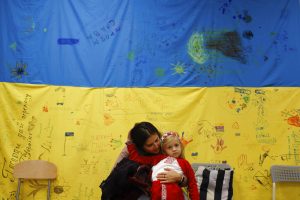A little over a year ago, Poland went from hosting hardly any refugees to being the world’s 2nd biggest refugee host — and all in just a matter of weeks. In years prior, the country accepted a few more refugees than South Korea, another ethnically homogeneous country that also faces a potential humanitarian crisis along its northern border. South Korea should pay attention to Poland now in preparation for the inevitable.
Although the Kim Jong Un regime doesn’t show signs of immediate collapse, the country is in a critical position. North Korea is currently supported by China and the Russian Federation. An economically and militarily weak Russia is thus a threat to North Korea’s stability – that’s according to former South Korean ambassador Lee Yang-goo, who spoke with me in a phone call. He said leaving China as the only big player in North Korea’s corner puts the Kim regime in an “uncomfortable position against a Western alliance,” as they would become even more reliant on and subject to the demands of an already frustrated China.
On top of this, North Korea is facing one of the most severe food shortages since the famine of the 1990s. The country is poised for an international humanitarian emergency.
And according to Lee, who spent the last seven years of his career as the South Korean ambassador to Ukraine, it’s only a matter of time before South Korea faces a flood of North Korean refugees similar to the one he’s seen in Ukraine. “Nobody imagined the sudden collapse of the Soviet Union,” Lee told me in an interview. “A small trigger can make North Korea collapse in a sudden way. If North Korea were to collapse tomorrow, there would be no big surprise.”
The nation needs to be ready for this inevitability, and currently, it isn’t. South Korea isn’t known for welcoming refugees, and isn’t ready for a flood of evacuees like we’ve seen from Ukraine into Poland. Among developed countries, South Korea has one of the world’s lowest rates of refugee acceptance. Many North Korean defectors, who can receive automatic citizenship under Korean law, travel on to Europe and the United States rather than try to integrate into South Korean society. If South Korea receives thousands of refugees across its border tomorrow, it won’t be culturally or structurally prepared to accommodate them.
Thankfully, the urgency of this situation is not lost on some South Korean leaders, who have already started researching the Polish refugee response. Krzysztof Szczęsny, the strategic director of a humanitarian aid center in Warsaw, was surprised by the detailed questioning from South Korean diplomats visiting the center. “They mentioned the similarities which we are having with the Ukrainians – same culture zone, similar language, formerly occupied territories,” he said. “They are contingency planning, and they can learn quite a lot from us.”
Youngchan Daniel, a representative of the Joint Action Committee for supporting Ukraine, agrees with Krzysztof. Youngchan was living and volunteering with Ukrainian refugees in Poland at the beginning of Russia’s invasion. After working with Krzysztof in the shelter in Warsaw, Youngchan invited him to visit South Korea to share his experience and garner support there.
Youngchan has met with Korean government officials and NGOs about responding to North Korean refugees, and says he can “feel” that his government is working on a program, although it is largely unofficial. South Korea could take practical lessons from how Poland managed such a large number of refugees at once. “Poland is one of the best countries for supporting the Ukrainian refugees.” Youngchan said. “They just opened their country. It’s a very good example for South Korea. It is not easy to open our country to North Korean people due to political issues.”
Like Korea, Poland is an economically developed country with different resources and infrastructure for refugees than traditional “tent city” refugee camp models. While the United Nations has great instructions for accommodating large numbers of refugees in sparse conditions, it has little guidance for the challenges faced by developed nations like Poland. The Polish had a crash course in humanitarian response logistics for the developed world, and it’s an ideal case study from which South Korea can learn.
As Szczęsny said, “We needed to know how to convert an expo hall or stadium for refugees, not something in the middle of the desert. We’ve made every mistake, and now we can sum up this knowledge and keep it as a manual for future crises.”
South Korea will be in a similar position if – or when – the North Korean regime collapses. If it pays attention now, it won’t have to reinvent the wheel.
































